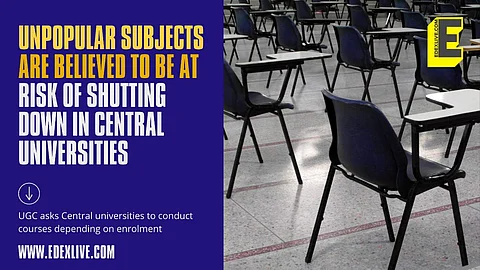

The University Grants Commission (UGC) sent a letter to 45 Central universities late last month where they have asked varsities to conduct courses based on the number of students enrolled. Referencing letters from the Ministry of Education and the Department of Higher Education, the UGC letter said, "It is requested that you conduct courses based on the demands of the students and the number of students attending a particular course and do a rationalization of all departments within the sanctioned number of students and teaching staff aligned with the number of students in each of these courses."
This essentially means that courses with low footfalls may soon face the axe. Professors of two major universities call this an attack on humanities and social sciences, language courses and research.
A professor at the Jawaharlal Nehru University's School of Arts and Aesthetics, YS Alone, said, "It is a systemic way of killing humanities and social sciences because a large number of such courses are in the field of humanities and social sciences. For instance, linguistic studies or philosophical studies are not very popular courses and are very exclusive in nature. Even art history. These courses see a minority in nature all the time."
When asked if he sees a possibility of such departments closing down across Central universities, including JNU, he said that it all depends on the "wisdom of the vice-chancellor of that particular university". There is also a fear that the move will hinder future employment opportunities. "Those who have specialised in minority subjects which are not very popular, will have a problem with employment."
The UGC letter to universities reads, "...there are some Departments which were started by Central Universities without any assessment of the number of students interested in such courses."
Letting numbers and popularity decide the fate of a course can be detrimental. JNU Teachers' Association (JNUTA) Secretary Dr Moushumi Basu said, "The idea of providing courses on the basis of demand itself is problematic. When you have students who are enrolled in a course, you are expected to teach (regardless of the number)." Basu believes this has to be seen in parallel to the National Education Policy, 2020, where blended mode of learning is promoted.
It is unclear as of now if JNU is amongst the 45 universities which have received the letter from UGC. JNU Vice Chancellor M Jagadesh Kumar was contacted via call and message multiple times, however, he remained unresponsive on the matter till the time of this report.
Abha Dev Habib, Secretary, Democratic Teachers' Front (DTF), and former member, Executive Council, DU, said that the authorities need to provide more support to the departments where enrollment is low rather than curb them down. Habib, a professor of Physics at Miranda House, said, "There is a tendency to marginalise courses with few students. As of now, even smaller number of enrollment is allowed for unpopular disciplines because they need to survive and shutting them down would have larger ramifications." Habib added that African studies, East Asian studies, Indian language departments including Sanskrit may be affected by the UGC advisory.
In a statement released on January 4, DTF said that the move by UGC poses a threat to language teachers and those in social science departments in terms of job losses and hinders academic growth of these areas. "It will weaken these subjects at the school level too. This exposes the farcical NEP propaganda that it emphasises on languages and diversity," DTF said in the statement.
Multiple attempts were made to reach out to DUTA President AK Bhagi, belonging to the BJP-backed National Democratic Teachers' Front. He remained unreachable. NDTF Vice President P Kumar refused to comment.
